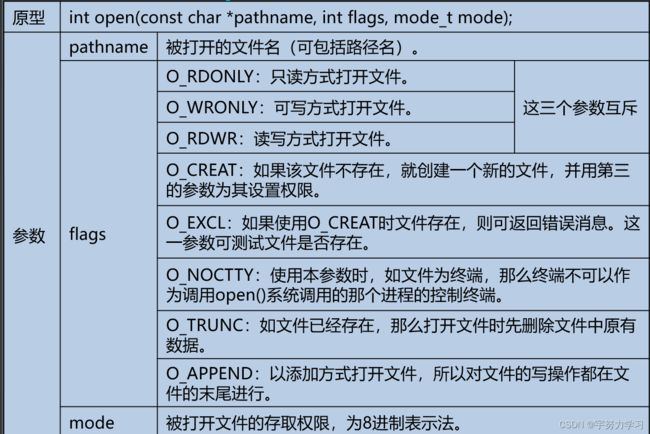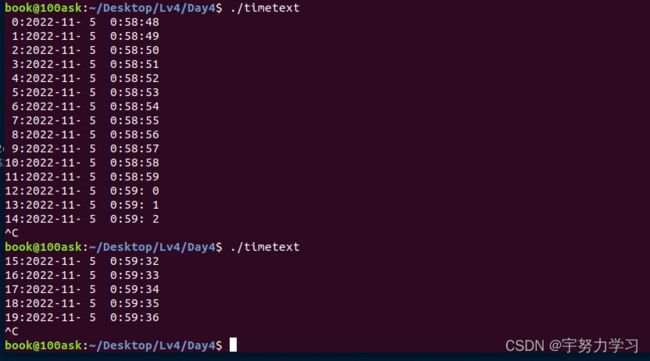Linux学习——文件IO
目录
一、文件IO的概念:
二、文件描述符概念:
三、文件IO 打开
四、文件的关闭
五、文件IO的读写和定位
六、使用文件IO实现“每隔1秒向文件1.txt写入当前系统时间,行号递增”
一、文件IO的概念:
什么是文件IO,又称系统IO,系统调用
是操作系统提供的API接口函数。
POSIX接口 (了解)
注意:文件IO不提供缓冲机制
文件IO的API
open close read read
二、文件描述符概念:
英文:缩写fd(file descriptor)
是0-1023的数字,表示文件。
0, 1, 2 的含义 标准输入,标准输出,错误
三、文件IO 打开
open
int open(const char *pathname, int flags); 不创建文件
int open(const char *pathname, int flags, mode_t mode); 创建文件,不能创建设备文件
成功时返回文件描述符;出错时返回EOF
文件IO和标准的模式对应关系:
r O_RDONLY
r+ O_RDWR
w O_WRONLY | O_CREAT | O_TRUNC, 0664
w+ O_RDWR | O_CREAT | O_TRUNC, 0664
a O_WRONLY | O_CREAT | O_APPEND, 0664
a+ O_RDWR | O_CREAT | O_APPEND, 0664
umask概念:
umask 用来设定文件或目录的初始权限
四、文件的关闭
int close(int fd)
关闭后文件描述符不能代表文件
#include
#include
#include
#include
#include
int main(int argc,char *argv[]){
int fd;
int ret;
fd = open("test.txt",O_WRONLY|O_CREAT|O_TRUNC, 0666);
if(fd<0){
printf("open file err\n");
return 0;
}
printf("sucess,fd=%d\n",fd);
ret= close(fd);
if(ret<0){
printf("close failed\n");
}
ret=close(fd);
printf("ret=%d\n",ret);
} 五、文件IO的读写和定位
容易出错点:
求字符串长度使用sizeof,对二进制数据使用strlen
printf 的字符最后没有’\0’
六、使用文件IO实现“每隔1秒向文件1.txt写入当前系统时间,行号递增”
程序:
#include
#include
#include
#include
#include
#include
#include
int main()
{
int i = 0,fd,ret;
time_t times;
char buf[32];
struct tm* ge;
fd = open("test.txt",O_RDWR | O_CREAT|O_APPEND, 0666);
if(fd<0){
printf("open file err\n");
return 0;
}
/*
while(fgets(buf,32,fp) != NULL)
{
if(buf[strlen(buf)-1] == '\n')
{
i++;
}
}
*/
char buf1[32];
while(read(fd,buf1,32))
{
for(int j = 0;j <32;j++)
if(buf1[j] == '\n'){
i++;
}
}
lseek(fd,0,SEEK_SET);
while(1){
times = time(NULL);
//printf("%d\n",(int)times);
ge = localtime(×);
printf("%2d:%4d-%2d-%2d %2d:%2d:%2d\n",i,ge->tm_year+1900,ge->tm_mon+1,ge->tm_mday,ge->tm_hour,ge->tm_min,ge->tm_sec);
sprintf(buf,"%2d:%4d-%2d-%2d %2d:%2d:%2d\n",i,ge->tm_year+1900,ge->tm_mon+1,ge->tm_mday,ge->tm_hour,ge->tm_min,ge->tm_sec);
ret=write(fd,buf,strlen(buf));
if(ret<0){
perror("write");
goto END;
}
i++;
sleep(1);
}
END:
close(fd);
} 实验结果:




